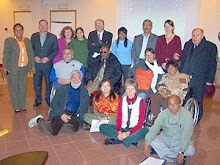How do you set up self-help groups? Under this area we are looking how persons affected with a chronic condition or persons with disability requiring regular health care support, set up a self-help group. How can you facilitate setting up of self-help groups? How do self-help groups develop over a period of time? How do they deal with conflict?
In the meeting held in Rome in December 2007, the group reached the following conclusions:
1. Coming together as group of persons with disabilities, of persons with chronic conditions and/or their family members is a key first step in the process for the paradigm shift that becomes an active subject in ensuring participation, continuity and sustainability.
2. Many persons with disabilities do not require any specific continuing or periodic medical care. For them disability may be part of their lives.
3. Forming a group is not automatic and needs care and facilitation in the beginning. An external facilitator can be useful in the beginning. However with greater experience and capacity building, persons with disabilities and/or persons with chronic conditions can and should also play this role.
4. Forming a group, sharing experiences and ideas can be a powerful tool to break isolation, to identify and access opportunties and strategies. Groups have to be based on participation, reciprocal confidence and relationships, and this requires time. Forming groups can pass through ups and downs, so it is important not to give up but to resist and find ways of overcoming initial difficulties.
5. Persons with disabilities, persons with chronic conditions and family members, may face different obstacles to find a place for meetings, barriers to travel and access meeting places, barriers to effectively participate and share in the groups. All these need to be acknowledged so that satisfactory solutions can be sought that respect dignity of persons.6. Once groups are formed, they liase and advocate for respect of their human rights.
Subscribe to:
Post Comments (Atom)


No comments:
Post a Comment